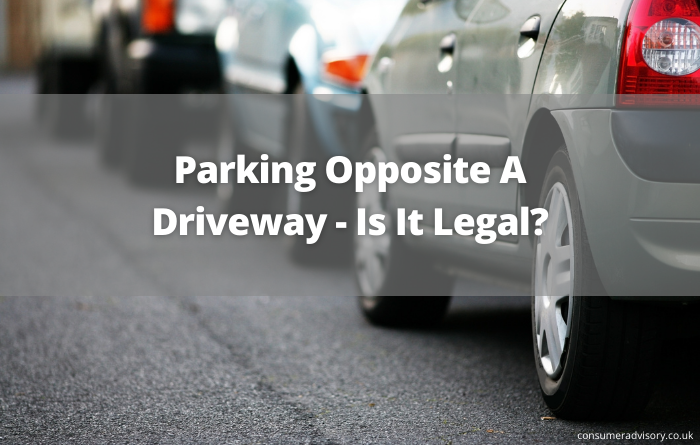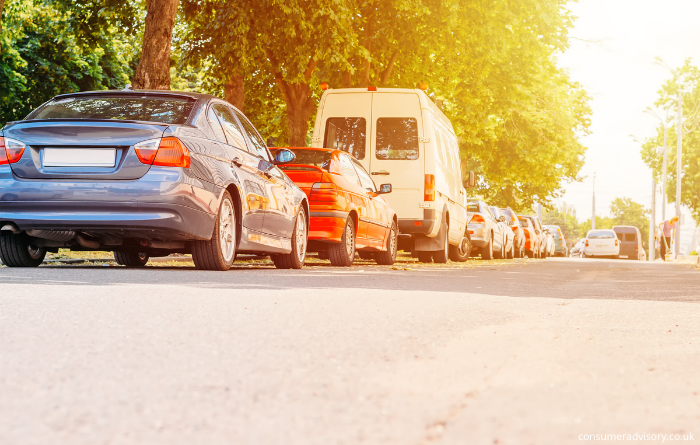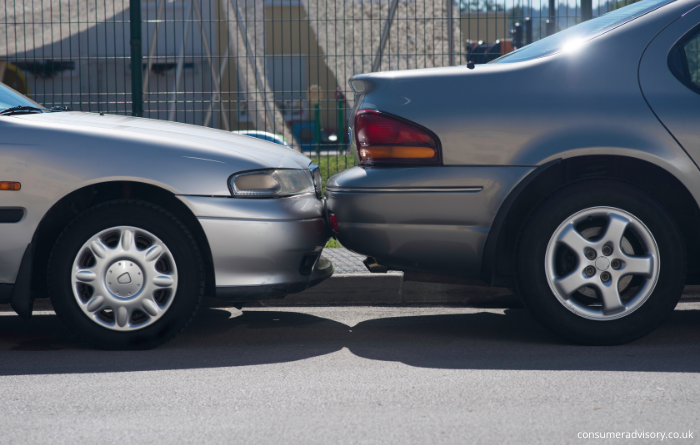
Parking opposite a driveway is not illegal. This is because it does not violate the Road Traffic Act or the Highway Code. So, you cannot be fined or charged with a traffic offence for parking on the opposite side of the road to a driveway.
In this article, we’ll explore the rules in more detail when it comes to parking across, near to, opposite and even ON driveways. We’ll explain exactly what is and isn’t legal, so that you know where you stand when it comes to parking your vehicle.
There is no law against parking on the opposite side of a road to a driveway, providing you aren’t violating any parking restrictions or parked on any yellow lines or on a dropped kerb. This means that you should not receive a fixed penalty notice for parking opposite a driveway.
Here’s where things change a little. Parking on a dropped kerb is a violation of the Road Traffic Act, and you could receive a fixed penalty notice for the sum of £100, along with three penalty points on your driving licence. This isn’t because you’re blocking a driveway, but instead because it is illegal to park on a dropped kerb.
So, even if you’re parked on a dropped kerb across your own driveway, you could find yourself receiving a fixed penalty notice if you are caught parking on the dropped kerb.

Here is where the law gets interesting. There is no law that prohibits a person from parking on someone else’s driveway. So, whilst you can’t park across someone’s driveway on a dropped kerb, you can park on their driveway.
This is because a driveway is private land. This makes the issue a civil issue, meaning that both the police will refuse to get involved.
Your local council has a responsibility to remove any abandoned vehicles from public and private property. However, if the vehicle is taxed, insured and MOT’d, it’s unlikely that the council will see it as a high priority for removal. This can make getting a car removed from your drive a difficult task.
Fortunately, this is not something that occurs often, so most people will not have to worry about resolving this type of issue. However, if this does happen to you, the best thing to do is to seek specialist advice from a solicitor.
It is not illegal to park close to a driveway, providing the vehicle is not on a dropped kerb. This applies even if the vehicle is blocking access to the driveway – no crime has been committed unless the car is on a dropped kerb.
Whilst it may be annoying if a car is blocking your access by parking too close to your driveway, it is perfectly within the law and there isn’t much you can do about it.
If someone is blocking your driveway, the best thing to do is to talk to them and ask them politely to move their car. If they are friendly and receptive, then they will probably be happy to move their car for you.
However, if the person is unwilling to move their car or they are abusive, the situation can be more challenging. In this situation, the police will only get involved if the car is parked on a dropped kerb. This is because it is not illegal to block a driveway, unless the vehicle is on a dropped kerb.

Yes, a driveway is classed as private property in the UK. This means that parking on someone else’s driveway would be classed as trespass. However, this is a civil matter that the police will not get involved in, so you would need to hire a solicitor to take action against a motorist parking on your driveway.
Many homeowners consider applying to the council for a dropped kerb when they are adding a driveway to their property. But what happens if you drop a kerb without getting permission from the local authority?
If you drop a kerb without receiving permission from your local authority, you could be fined up to £1,000, as well as being ordered to return the kerb to its original height. For this reason, we’d always recommend seeking permission from your local council before beginning work.
In general, the public has no right to park on a private road. This is because the road is privately owned by an individual or business, so they control access and parking rights. Parking on a private road without consent could be considered trespass, and could result in charges being brought against you.
The pavement outside your house is most likely owned by your local council. This means that they are responsible for maintaining the pavement, and must be contacted for consent for any alterations to the pavement.
If you own a piece of land and find that a vehicle is parked without permission, you might be wondering whether you are within your rights to clamp the vehicle.
Unfortunately, it remains illegal to block, clamp or tow away a car that is parked on private land, unless you have the authority of the council or police.
The law for parking on pavements states that vehicles must not be parked on the pavement unless it is:
– a designated parking space
– part of a loading bay
If you are found to be violating this law, you could be issued with a Penalty Charge Notice (PCN) by your local authority.
There is no law stating that you can’t park in front of someone’s house, so long as you are not causing an obstruction. This means that if you find a car parked in front of your house, there is no legal action you can take to have the car removed.
The best thing to do in this situation is to talk to the driver and politely ask them to move their car. If they are willing to cooperate, then the problem should be easily resolved.
You might be tempted to put cones in front of your driveway to stop people from parking there. However, this is not recommended as it could create an obstruction, which is a criminal offence.
Many motorists are surprised to learn that it is illegal to park across their own driveway if there is a dropped kerb in place. However, parking opposite a driveway remains perfectly legal, providing the vehicle is not contravening parking signs, or parked over a dropped kerb or yellow lines.
Copyright © 2025 Consumer Advisory. All rights reserved.